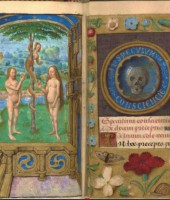Thought about Conscience and the Church
Seminar organized by Emily Corran, UCL, Paris IAS Fellow, and Christophe Grellard, EPHE-PSL, as part of the series "Conscience and the Sources of Moral Authority".
Admission is free without prior registration, subject to availability.
To attend this session remotely, please contact emily.corran@ucl.ac.uk or christophe.grellard@ephe.psl.eu to receive the connection link.
With the participation of :
Professor David d’Avray (UCL)
‘The Medieval Papacy and Moral Uncertainty’
Did twelfth and thirteenth century popes address moral uncertainty in official documents? It is hard to find anything comparable to the pronouncements of popes in recent times on bioethical questions and social justice, or any real equivalent to ‘encyclicals’ in the modern sense. This is because papal documents of the medieval period are mostly in a more or less legal mode. They were religious, certainly, but seldom dealt with questions of conscience that had no connection with canon law, broadly defined. Nonetheless popes did deal with problems that went beyond positive law into the realm of conscience. This happened especially when they dealt with the sacraments. In that field, the line between man-made law and divine institution could be unclear, and the unclarity was the source of the uncertainty. Case studies are examined and their influence of confessional practice assessed.
Responder: Arnaud Fossier
Dr Felicity Hill (St Andrews)
‘Licit and illicit absolution: who could absolve from excommunication and in what circumstances?’
That certain sins were reserved to bishops or to the pope is well-known. These were typically either serious offences or transgressions that were covered by ipso facto excommunications. Reserved absolutions were publicised through synodal statutes and in pastoral manuals but must sometimes have been contravened. As the thirteenth-century progressed, complaints and reminders focused not only on lesser clergy but also on unscrupulous friars absolving those who they had no right to absolve. This paper will focus on such complaints as well as the rationale used to explain these reserved cases. Moreover, lesser clergy were to send penitents with letters explaining the sin and its circumstances, with implications for breaking the seal of the confessional.
Responder: Julien Théry
|
|
|
Casuistry, the Laity and Ecclesiastical Hierarchy in the Late Middle Ages: Rule-based ethics in complex institutions 01 September 2022 - 30 June 2023 |
|
|


